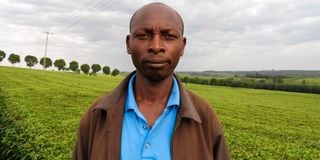Premium
'Sex pests managing tea farms fired me and stole my wife'

David Onyancha, a former employee of a tea multinational. Onyancha, who is now jobless, says a supervisor on one of the estates had an affair with his wife. Onyancha lives on the outskirts of Kericho town.
Even as authorities investigate the shocking claims of sexual abuse in tea multinationals, the Saturday Nation has established that the vice has left a trail of broken families in its wake.
“Sex for work”, an expose by the BBC, found that more than 70 women had been abused by their managers on plantations operated by two British firms – James Finlay and Unilever (now Ekaterra).
It is said that some victims contracted HIV and other sexually transmitted infections, while others were forced to terminate pregnancies.
Some of the 50 women who have filed a lawsuit against the companies through Kericho-based lawyer Gilbert Kemboi say the abuse by their bosses destroyed their dignity and families.
Male employees have also talked of a toxic work environment full of sex pests and put their unions under undue pressure. They complain of having watched helplessly as their marriages crumbled.
Onyancha* and his ex-wife are co-parenting after breaking up in 2021.
“My wife had an affair with our supervisor and later moved out of our home,” he said.
The two had been working for Unilever since 1998, raising their three children at Cheymen estate.
Trouble started in 2016 when the woman expressed her desire to change duties from hand-picking tea to using machines, which were considered to pay better.

Workers pick tea at Unilever tea estate in Kericho County in this file photo. Women’s rights groups have called for revoking of licences of two British-owned tea estates implicated in BBC's sex for work exposé .
“I encouraged her to do it. She later informed me that the request was approved when the supervisor forwarded their names to the assistant manager,” he said.
“Strange” phone calls
It was through “strange” phone calls from the supervisor at night that Onyancha became suspicious.
The constant “non-work-related” communication and her uncharacteristic late-coming strained their relationship to the point that he reported the matter to then-divisional manager Christine Sambai who said she could not act on hearsay.
What broke the camel’s back was the transfer of his wife to the Kapkwen estate where the supervisor had been moved to.
“One day, I came home to find she had quietly taken our children with her,” he said.
Onyancha had by that time been dismissed for “absenteeism”, though he says he was on sick leave.
He now lives alone in Brooke trading centre on the outskirts of Kericho town, doing manual work.
“I have thought of remarrying, but that will mean abandoning my children,” he said.
“I am very bitter with Ekatera. We had to give up our women or part with money to survive, only to end up homeless in the streets.”
The script was the same for Willis*. He preferred to have his identity hidden as he still works for Ekaterra.
A supervisor was after his wife who served in the company’s Cheymen estate. Willis decisively acted on the matter, secretly recording a conversation as the supervisor seduced his wife in a night call.
With the evidence, he bought their freedom from the boss, saving his wife, though the ghosts of the affair crop up whenever they have an argument.
Two victims of John Chebochok, the Finlay contractor who was caught on camera sexually harassing job seekers, said their husbands left on learning of the matter.
Husband left
The husband of Lorna* left immediately after learning what happened.
“I felt broken and remorseful but my husband’s departure created more need to protect the job for my children’s sake. I would still agree to sleep with Chebochok whenever he threatened to end my contract,” she said.
For Jessica*, it became a protracted case that ended up in the company’s dispute resolution office, which they call “court”.
“He reported to the committee that I had denied him sex. It was in good faith because Chebochok pressed me to sleep with him without protection. I feared for myself and my husband,” Jessica recalled, adding that the man remarried and had other children.
“He beat me badly and even cut me with a panga. He had already left when I was discharged from the hospital”.
Jessica developed blood pressure as a result and continues to dodge the very sex pests that led to her marriage breaking.
Following the BBC expose, the multinationals suspended four managers implicated in the vice, though none has been arrested as the victims have not recorded statements with the Directorate of Criminal Investigations (DCI).
The women are said to have shied away because of the stigma and public interest.
While certifying the case as urgent on March 15, Justice J Sergon issued the petitioners orders to serve the companies and involve the witness protection unit in the case.
The order came after Mr Kemboi, acting for the more than 50 victims, filed a notice of intention to sue if the firms did not admit liability for violating the women’s rights.

A tea plucking machine in operation at a tea estate in Kericho county. A boy had his head decapitated by a tea plucking machine at Cheptabes tea estate owned by multinational tea company James Finlay Plc in Bomet county on January 16, 2023.
“Finlay’s Kenya and Ekaterra have violated provisions of the Constitution, Employment Act, 2007, Sexual Offences Act, 2006, Occupational Safety and Health Act 2007, the Convention on Elimination of All Forms of Discrimination against Women 1981 and the International Labour Organisation Convention,” Mr Kemboi said.
Kenya Plantation and Agricultural Workers Union (KPAWU) Kericho Branch Executive Secretary, Dickson Sang, said sexual harassment in the plantations has had monumental effects on households.
“Due to the economic challenges, the women will give in to the demands of these managers or supervisors. It marks the start of conflicts, violence, separation, and even divorce the moment their husbands find out,” Mr Sang said.
"Not aware"
Ms Slyvia Ten Den – the Ekaterra MD in charge of Kenya, Rwanda and Tanzania – said the company was not aware of the cases before the BBC expose.
Responding to inquiries by the Saturday Nation, the company said it has multiple channels available to its employees for reporting sexual harassment.
“We have a zero-tolerance policy against sexual harassment. Any cases of sexual harassment and gender-based violence are promptly investigated, and appropriate action is taken, including referral to the criminal justice system,” the Ekaterra statement reads.
James Finlay, a subsidiary of the Swire Group in London, said it has commissioned two independent investigations to examine the specific claims in the expose.
The investigation is being conducted by the NGO Partner Africa, which specialises in ethical working practices, and law firm Bowmans.
It seeks to see if the company can improve its approaches in preventing and addressing sexual violence, abuse or harassment across James Finlay sites.
“We are delivering an action plan to reinforce the existing safeguards. Finlay remains committed to taking decisive action to ensure our workers feel protected and supported,” it said.
James Finlay says 1,527 cases relating to sexual harassment and exploitation, theft, and substance and drug abuse had been reported in the last five years. While 171 of the cases are of sexual exploitation, eight are pending in a Kericho court, while 92.7 per cent have been dealt with.






